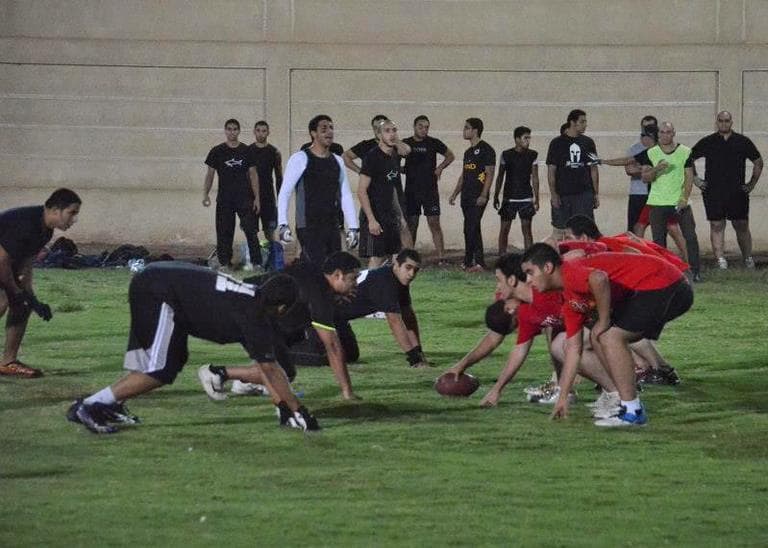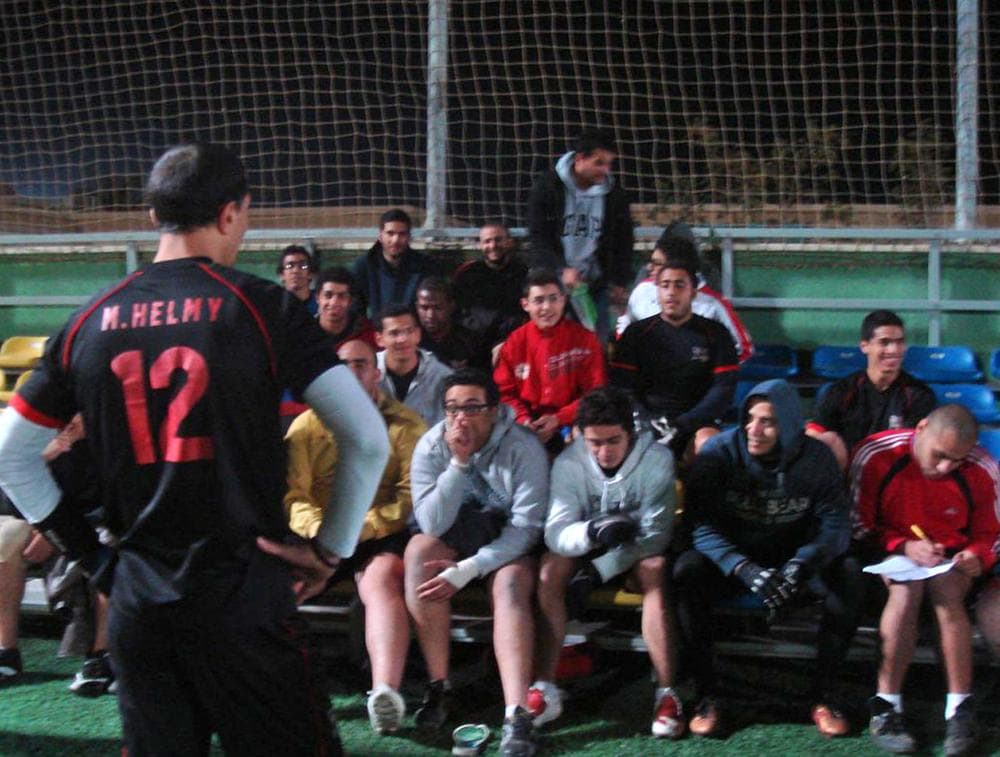Advertisement
Feature
Egypt Tackles American Football

In Egypt this weekend, people are voting in the second round of a referendum on the country's draft constitution. Human rights organizations worry the draft, which looks likely to be approved by voters, fails to protect civil liberties and the rights of minorities.
One thing the controversial document does enshrine: sports. Article 61 starts by stating-- “Exercising sports is a right that all individuals are entitled to,” and goes on to say the country “shall take all required measures to encourage the exercise of sports.”
Sports have suffered in Egypt since the country's revolution, especially those just getting started, like the group trying to bring — and explain — American Football in the aftermath of the Arab Spring.
We wanted to show people that this is a good game, and we’re athletes, not just big guys who go to the gym and have big muscles or something. We’re trying to introduce a culture, not only a game.
Louay Ali, Cairo Sharks co-founder
Far out in the suburbs of Cairo, off a dusty desert road in a secluded upscale compound, the Cairo Sharks finally played a friendly match against the Rehab Lions. It's a conservative country, so even though the games are free, there was no drinking, no cheerleaders, no half-time show. The independent team of about 40 football players had been trying to schedule this game for more than a month.
"It had a lot of delays because of the political things that are happening in Cairo right now," said Sharks co-founder Louay Ali. "Players and parents of players, most of them are worried about the state of, it's dangerous or not to stay in the streets or not, if it's safe to go play in a game or not."
Ali said his team has had many ups and down since their start earlier this year. After the revolution, they had to cancel away games in Saudi Arabia and the United Arab Emirates because the military transitional government denied travel visas for the players. More recently, they've had trouble even getting to practice. Many of the Sharks' players live in the area around the presidential palace, where violent protests leading up to the constitutional referendum closed down roads and neighborhoods.
Advertisement
Despite the problems, sports journalist Inaz Mazhar said American football has traditionally been a sport limited to Egypt's rich. It's even parodied in Egyptian movies when portraying the country's westernized elite. But she said there's currently a unique opening for the sport to reach a wider audience.

"This is the best time, nowadays, for such an activity to come to light in Egypt," Mazhar said. "Because of the political unrest or whatever is going on until now, for two years, we have no real sports events taking place in Egypt."
Violent clashes and protests at soccer games since the revolution forced many local teams to cancel matches, leaving Egyptians with little to watch other than European soccer. WWE wrestling even drew a crowd in the conservative Muslim country back in October.
But there are challenges to getting Egyptians interested in football. For one thing, most Egyptians see the sport as too violent. Another problem is that people don't really know how to play. The Sharks post basic football instructional videos on the team's Facebook page, which it uses to recruit new members, and depends on older players to teach the inexperienced ones.
18-year-old running back Mohamed Hamdy Seif learned the game that way after his friends in college encouraged him to join the Sharks.
"I didn't know there was football in Egypt until six months ago," Seif said. "And I came and I didn't skip any training."
And, as co-founder Ali pointed out, the game is expensive, and the team doesn't bring in much cash from the roughly $25 in dues it collects from players each month. So to buy equipment for the team, Ali and the other two founders have shelled out thousands of dollars — tens of thousands of Egyptian pounds — from their own pockets.
"We've extracted more than 40,000 in savings in total," Ali said. "And these were the savings to buy a car, to buy a motorcycle, to buy something. But we believe in getting the equipment. So we extracted the money from our savings to buy the equipment."
The team is hoping the good show will be enough to bring out more fans than the dozen or so who showed up for this game. All of them were cheering for the other team, even if they had no clue what was going on.
"Well they play, I think, the cornerback and the receivers," spectator Norah Soliman said. Asked if she knew what those positions were, she said, "Uh... Actually, I have no idea. I'm just supporting, you know, without knowing anything."
"I don't know anything about American football," Mohamed Tarek said. "I am supporting them because they are my friends. No more, no less."
The team has used its scarce funds to bring in some American coaches to prep them for the games they hope to play in neighboring countries this spring. Ali admitted the constant delays and political upheaval get frustrating.
"But we're determined so much in doing this, and we believe in this," Ali said. "And we love football, really. We know how it works in sports and we know how it works in Egypt. So we wanted to show people that this is a good game, and we're athletes, not just big guys who go to the gym and have big muscles or something. We're trying to introduce a culture, not only a game."
American football culture with its own Egyptian flair. And the Sharks crushed the Lions, 86-0.
This segment aired on December 22, 2012.